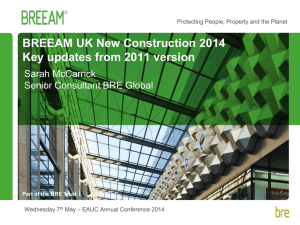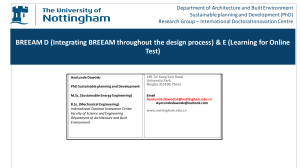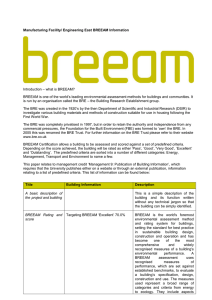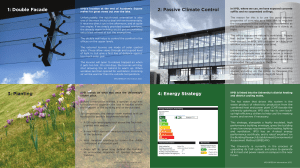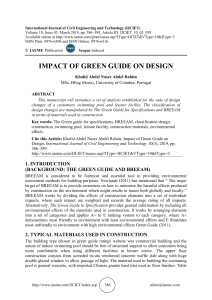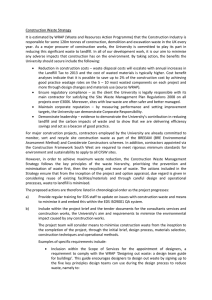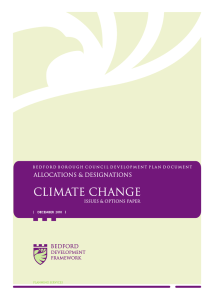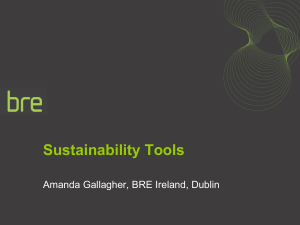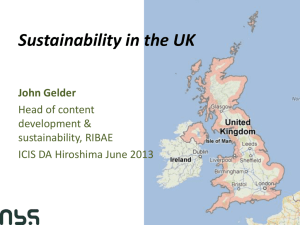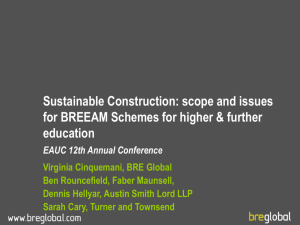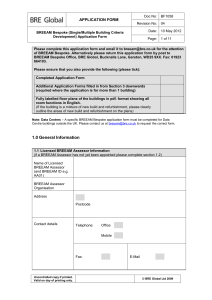BREEAM UK New Construction 2014 Key updates from
advertisement
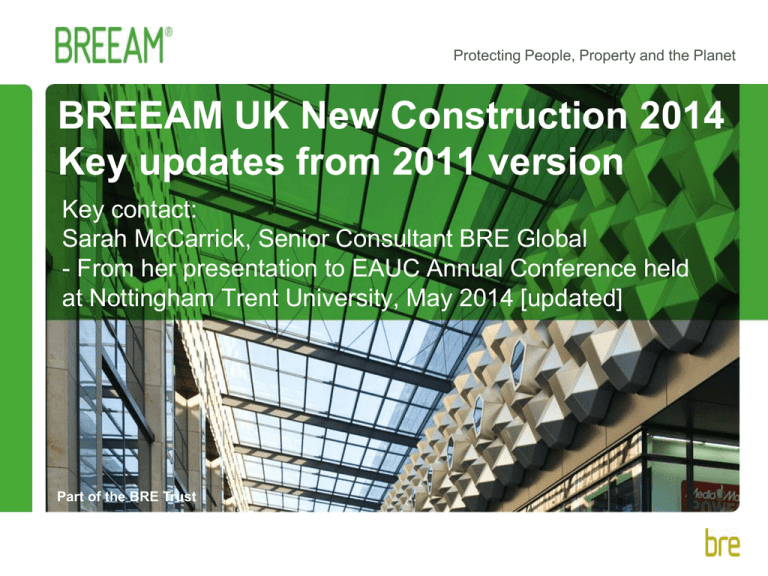
Protecting People, Property and the Planet BREEAM UK New Construction 2014 Key updates from 2011 version Key contact: Sarah McCarrick, Senior Consultant BRE Global - From her presentation to EAUC Annual Conference held at Nottingham Trent University, May 2014 [updated] Part of the BRE Trust BREEAM UK New Construction (NC) - scheme update UK BREEAM 2011 version updated to 2014 version: • Changes to Regulations: Part L 2013 / Section 6 2013 • Accounting for new / updated standards e.g. new Standards for Sustainable Drainage systems (SuDs) • CEN / TC350 European Standards: further alignment with relevant metrics / indicators • Maintain recognition and reward for ‘Best Practice’ in sustainable construction • Feedback from network of assessors, clients and other stakeholders, What’s working / not working in BREEAM BREEAM NC update – key steps 1. External Consultation Ph 1 – Consultation: Mar-Oct 2013 – Two surveys on 2011 scheme – Stakeholder workshops e.g. UK Green Building Co, BSRIA, CPA, CIBSE 2. Feb 2014: Draft published 3. External Consultation Ph 2 Consultation: Feb – Mar 2014 www.breeam.org/2014 Protecting People, Property and the Planet Technical Update Mainly small changes – some revised weightings Key technical changes for NC 2014 Management Now aligned with procurement process. New issue headings are: – Project Brief & Design – LCC & Service Life Planning – Responsible Construction practices – Construction & Handover – Aftercare Project Brief & Design Sustainability Champion replaces Accredited Professional LCC & Service Life Planning New credit for reporting on project costs Health & Wellbeing Visual Comfort Alternative option for daylight calculation: average illuminance & min. illuminance Thermal Comfort New credit relating to adaptation to climate change Safety and Security Security Needs Assessment replaces Secured by Design related criteria Reduction of Energy use and CO2 Emissions Energy Performance Rating credits now calculated on building regulations of country where building is located [Under BREEAM 2011 the Part L 2010 Notional Building was used as baseline for ALL buildings assessed under BREEAM NC, regardless of their UK country location] Number of available credits reduced from 15 to 12 [Reflects tightening of building regs with respect to operational energy consumption from regulated fittings / systems and therefore shifting of importance (and weighting) of impacts in BREEAM] Reduction of Energy Use and CO2 Emissions Minimum standards adapted. CO2 requirement removed Low Carbon Design (replaces ENE 04 LZC issue) LZC percentage carbon reduction targets removed LZC feasibility study & free cooling credits retained New credit for passive design Energy Efficient Laboratory Systems Revised criteria now relating to efficient design No longer applicable to schools Proximity to Amenities Now grouped into ‘core’ amenities and ‘additional’ amenities Clarifications e.g. ‘access to cash’ not ‘cash machine’ Cyclist facilities – Revised assessment criteria layout – Large buildings / rural requirements reviewed (reductions for some scenarios) No major changes for: Water Leak Detection Issue restructured. Content broadly the same Water Efficient Equipment Rationalised to focus on ‘unregulated water’ rather than specific aspects of e.g. irrigation & vehicle wash Responsible Sourcing of Materials Revised scoring and tier levels Designing for Durability & Resilience Change from Designing for Robustness New requirement relating to material degradation e.g. corrosion, rotting, discolouration New Issue: Material Efficiency Aim: to recognise and encourage measures to optimise material efficiency to minimise environmental impact of material use and waste No major changes Construction Waste Management Reviewed resource efficiency benchmarks but no change Terminology amended: “Resource Management Plans” replace “Site Waste Management Plans” Recycled Aggregates Benchmarks updated Functional Adaptability – New Issue Aim: To recognise and encourage measures taken to accommodate future changes of use over its lifespan Including: o internal environment to accommodate changes in working practices o the internal physical space and external shell to accommodate change in use o Design for ease of replacement of all major plant within the life of the building o Ability for major refurbishment, inc replacing façade Land Use and Ecology Category – Review informed by Steering Group of ecology experts – Clarifications and movement of criteria – First stage of wider review beyond the scope of 2014 No major changes Impact of Refrigerants New standards incorporated (BS EN 378: 2008) Clarifications to automated shutdown criteria NOx Emissions Reviewed but no change in NOx levels BREEAM NC 2014: New Weightings Environmental Section 2011 Weighting 2014 Weighting Management 12% 12% Health and Wellbeing 15% 15% Energy 19% 15% Transport 8% 9% Water 6% 7% Materials 12.5% 13.5% Waste 7.5% 8.5% Land Use and Ecology 10% 10% Pollution 10% 10% Recognition of regulatory improvements on energy performance Recalculation of Energy section / adjustment of Environmental section weightings accordingly BREEAM NC 2014 went live 27 May Operational update underway e.g. website, assessment tools, training courses etc. Protecting People, Property and the Planet For further information contact: Sarah McCarrick, Senior Consultant BRE Global Phone 01904 567784 mccarricks@bre.co.uk
